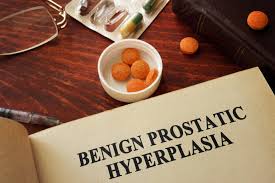Benign prostatic hyperplasia (BPH), formerly known as prostatic hypertrophy, is one of the common diseases in elderly men and a benign lesion of the prostate. The lesion starts from glandular tissue, connective tissue and smooth muscle tissue in the middle or lateral lobe of posterior urethral mucosa, thus forming mixed spherical nodules.
Obviously, bilateral and middle lobes proliferate into the bladder or urethra, pressing the bladder neck or urethra, and causing lower urinary tract obstruction. When BPH causes obstruction, the detrusor muscle of bladder becomes thicker, and trabeculae, ventricles and diverticula appear in the mucosa.
Long-term dysuria makes bladder highly dilated, bladder wall thinned, bladder internal pressure increased, the end of ureter lost its valve function, resulting in bladder and ureter reflux.
There are many studies on the pathogenesis of BHP, but the etiology has not yet been elucidated. The balance between proliferation and apoptosis of epithelial and mesenchymal cells may be destroyed. Other related factors include androgen and its interaction with estrogen, interaction between prostatic stromal and glandular epithelial cells, growth factors, inflammatory cells, neurotransmitters and genetic factors.

In recent years, it has also been noted that smoking, obesity and alcohol abuse, family history, ethnicity and geographical environment are related to the occurrence of BPH. People who like spicy food, greasy food, smoking and drinking are more likely to suffer from BHP because spicy food and alcohol have stimulating effects on the prostate and urethra, and can cause discomfort or vasodilation lead to symptoms such as hyperemia and edema of the prostate, thus reducing the resistance of the prostate.
Other studies have shown that obesity caused by excessive nutrition is associated with BPH, and excessive consumption of nutritious foods such as fat, meat and dairy products increases the risk of BPH.
Therefore, in the daily diet, patients with BHP should eat more fruits and vegetables. Moreover, they can have Vitamin D as a supplement to reduce the risk of BHP. Sexual indulgence, excessive sexual life will lead to congestion of sexual organs, and prostatitis rate will also increase because of persistent congestion, excessive persistent congestion will increase the risk of BHP.
And dirty sex can cause organ infections, which can reduce resistance. In addition, we should pay attention to the cleanliness of the prostate, because the scrotum and prepuce are easy to hide dirt, and dirty bacteria may take the opportunity to enter, leading to prostate disease.

Aging and high level of androgen are two main factors for BPH. The main symptoms of BPH are bladder irritation symptoms caused by frequent urination and acute urinary pain, and dysuria symptoms manifested by fine urine line, short range, laborious urination and waiting for urine. BPH seriously affects the quality of life and work of middle-aged and old men.
Generally speaking, positive treatment is needed to alleviate symptoms.For mild or moderate BHP, the symptoms can generally be alleviated by oral drugs. Diuretic and Anti-inflammatory Pill is an effective medication. In TCM, urinary tract irritation symptoms must be eliminated by diuretics and stranguria-relieving drugs. The plantain seed and the seed of cowherb in Diuretic and Anti-inflammatory Pill can play this role.

